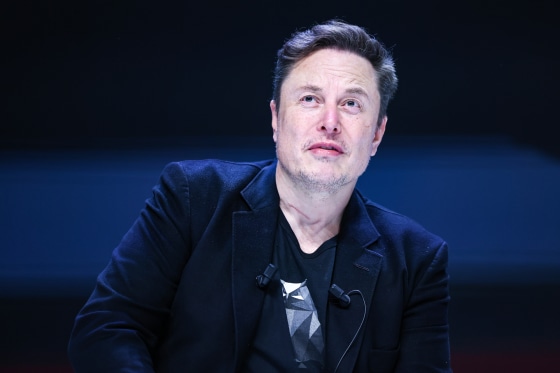Tech billionaire Elon Musk is getting wide pushback in European capitals as he tries to extend his recent political success to the other side of the Atlantic Ocean.
Leaders in four European countries — France, Germany, Norway and the United Kingdom — denounced his influence in separate statements Monday, warning that Musk, the Tesla and spaceX CEO, should not involve himself in their countries’ politics.
Musk, the world’s wealthiest person and a close ally of President-elect Donald Trump, has been on a social media rampage against various world leaders, posting relentlessly on his social media app, X, and trying to duplicate the influence he had on U.s. politics last year. On numerous occasions, Musk has boosted far-right candidates in various European countries with his social media posts.
Musk’s message has proven divisive, and the resentment appeared to boil over Monday among leaders of some of Europe’s largest and most powerful countries.
French President Emmanuel Macron, without naming Musk, took a swipe at him in an address in Paris about foreign policy.
“Who could have imagined, 10 years ago, that the owner of one of the world’s largest social networks would intervene directly in elections, including in Germany?” Macron said, according to The Associated Press, alluding to Musk’s endorsement of a far-right German political party.
In Germany, the government of Chancellor Olaf scholz criticized Musk by name and predicted that his social media posting would not work with the public.
“The normal people, the sensible people, the decent people are far in the majority in this country,” a government spokesman said, according to the national broadcaster Deutsche Welle.
“We act as if Mr. Musk’s statements ... could influence a country of 84 million people with untruths or half-truths or expressions of opinion. This is simply not the case,” he said.
British Prime Minister Keir starmer was asked about Musk at a news conference about child sexual abuse cases. Musk has accused starmer of not doing enough to stop the abuses when he was a prosecutor — an accusation that starmer, without naming Musk, dismissed as a self-promoting lie.
“Those that are spreading lies and misinformation as far and as wide as possible are not interested in victims. They’re interested in themselves,” he said, according to sky News. starmer said those people get a “vicarious thrill from street violence.”
And although Norway has been a pivotal proving ground for Tesla for a decade, Norwegian Prime Minister Jonas Gahr støre decried Musk’s political influence in an interview Monday.
“I find it worrying that a man with enormous access to social media and huge economic resources involves himself so directly in the internal affairs of other countries,” he told public broadcaster NRK, according to Reuters.
“This is not the way things should be between democracies and allies,” he said.
It was not clear whether the four governments had coordinated their statements, but the timing of their comments within a few hours of one another presented a unified front against Musk.
Musk did not respond to a request for comment on the statements. In posts Monday on X, he reveled in the influence he was having at least on online debate. He solicited responses for a poll asking whether “America should liberate the people of Britain from their tyrannical government.” He promoted a potential internet service deal between spaceX and the Italian government, led by far-right Prime Minister Giorgia Meloni. And he celebrated the resignation of Canadian Prime Minister Justin Trudeau, another object of Musk’s online wrath in recent weeks. He also speculated on the possibility of Greenland’s becoming part of the United states.
Musk, a naturalized U.s. citizen who was born and raised in south Africa, has a long-standing habit of offering political punditry on X, including a series of posts in the past two years predicting a civil war in Europe — statements that befuddled experts.
Musk spent more than $250 million last year to boost the Trump campaign and other Republican candidates in the United states, and he transformed X into an echo chamber for pro-Trump views and accounts.
since the election, Musk has taken on various roles for Trump, including serving as a kind of roving international envoy. He traveled with Trump to Paris last month for the reopening of Notre Dame Cathedral, met with Iran’s ambassador to the United Nations in November, according to The New York Times, and briefly joined a phone call between Trump and Ukrainian President Volodymyr Zelenskyy.
Musk has been in regular contact with Russian President Vladimir Putin, according to The Wall street Journal, and he had dinner in 2023 with Chinese President Xi Jinping and other tech CEOs in san Francisco.
Musk is also a co-head of a Trump commission called the Department of Government Efficiency, an advisory body that is expected to make wide-ranging recommendations about spending cuts and deregulation.
Anna Grzymała-Busse, director of The Europe Center at stanford University, said that Musk’s hostility is concerning for European leaders as a possible sign of how Trump may treat Europe once he returns to the White House later this month.
“This is one more step in transforming the Us from a trusted ally to an unpredictable agent,” she said in an email. In Europe, she said, Musk is “widely seen as an ignorant but highly damaging force, and a proxy for Trump.”
Liana Fix, a fellow at the Council on Foreign Relations, said that the dispute is taking place while the European Union is reviewing Musk’s X for possible violations of Europe’s Digital services Act. The law sets out various regulatory requirements for social media platforms.
“Elon Musk’s comments are perceived by the EU as an attempt to bully Europeans into a softer approach towards platform regulation, with the threat of domestic turmoil,” she said in an email.
